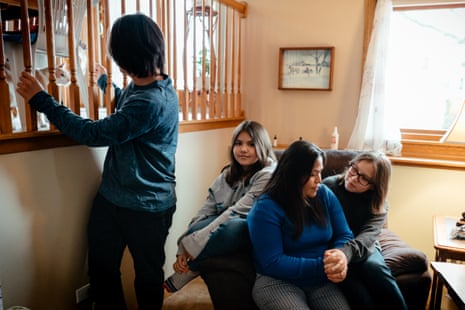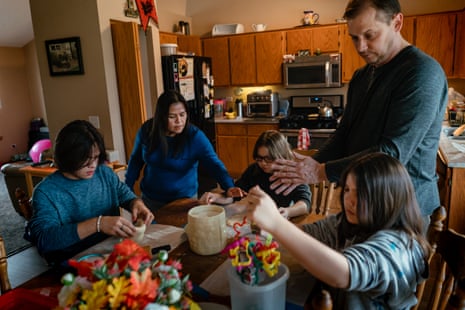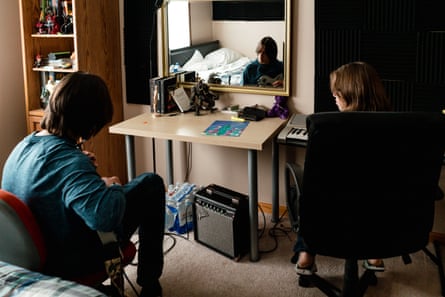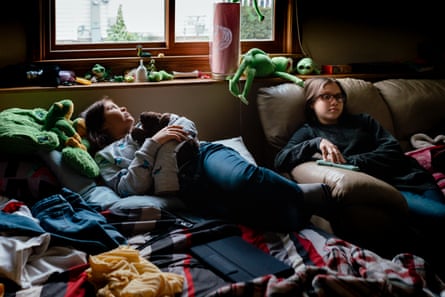Tom Kobylecy and Yedid Sánchez’s budding romance took place amid the intoxicating odor of woody oak and sawdust of a Chicago-area Home Depot. Her cleaning shift started at 6am, just as his shift restocking store shelves was ending. He would linger to strike up a conversation, but Yedid, a native of Cuernavaca, Mexico, spoke little English. The few Spanish words he could muster came out in a nasally midwestern accent.
After a few stilted attempts at conversation with the help of bilingual friends, she asked for his nombre, Spanish for name. “I thought she was asking me for my number,” Tom said. So, naturally, he gave her his number. A week later he asked her out for pizza. On their second date, he asked her to go fishing. Tom caught three and prepared them shake ’n’ bake-style. Yedid didn’t let on that the meal was not particularly appetizing – if she had they might not have kissed later that evening.
Comical misunderstandings and fumbled translations with the aid of a pocket dictionary were a feature of those first weeks together. On one of their dates, they agreed to meet at a restaurant, not realizing that they were thinking of different restaurants that had the same name. “He was angry because I didn’t show up, I was angry because he didn’t show up,” Yedid laughed.
Logistical snags aside, Tom had a good feeling about where things were headed with Yedid, even if others expressed doubts. “[A friend] told me I was naive, that Yedid was just using me to get her immigration papers,” Tom said.
Despite the objections of his friend, he asked her to move into his one-bedroom apartment after a few months of dating. Tom told his family and friends that he would not rush things with Yedid even more than he already had. It was a promise he had no intention of keeping. “I was planning on marrying her when we moved in together,” he said. “I didn’t tell her right away, but I knew.”

A few months later, at the Aurelio’s Pizza restaurant where they had their first date, Tom proposed with his mother’s wedding ring, and Yedid accepted without hesitation. “We couldn’t afford a big wedding, we were broke,” Tom said. They married in January 2004 in a Cook County courthouse. Only a few close friends and family were in attendance. “It was a shaky start,” Yedid said of their nuptials.
They had no money to speak of, but dreamed of someday buying a house in a middle-class neighborhood where their son, Teddy, born in their first year of marriage, would play in the street.
But their life together was shrouded in a secret. Yedid was not living legally in the country.
Yedid’s parents operated a food stand called Antojitos Doña Mago in Cuernavaca that served quesadillas, gorditas, and tacos. Her father’s poor health shifted the burden of running the business, and household, to her mother. The money they made from the food stand was barely enough to keep the family afloat, much less pay for the medication her father required for Type 2 diabetes. His condition had already led to a heart attack and a blood clot in his leg.
Their struggle was familiar to the community, and the remedy was the promise of a well-paid job in the United States for anyone willing to risk unauthorized immigration. “My mother didn’t like the idea of me going,” Yedid said, “but she preferred to give me her blessing than to have me leave without it.”
In February 1997, at just 15, Yedid crossed the US-Mexico border for the first time, and made her way to Chicago.
Yedid lived under the radar, cobbling together work as a housekeeper and looking after the children of well-to-do families. She had dutifully sent money home to help her parents until her life with Tom changed everything. Tom did not want her to risk working illegally, fearing that it could get her deported. And neither of them wanted a life in the shadows for little Teddy. Immigration attorneys cautioned them against navigating the immigration system alone. However, the cost of their expertise was prohibitive, and besides, Tom was confident he could handle the necessary paperwork on his own.
Everything went smoothly when they were summoned to appear for an interview at the US consulate general in Ciudad Juárez, across the border from El Paso, Texas. They discussed the possibility that Yedid might be slapped with a three-year ban from the country for her border-crossing transgressions. If that happened, Tom would remain in the US, while Yedid and Teddy would stay with her parents in Mexico. He would visit them as often as possible.
She walked into the interview nervous, yet upbeat. She came back in tears.

Yedid was barred from returning to the US for no less than 10 years.
“She said, ‘It’s over, if you want to leave me I understand,’” Tom recalled.
She confessed to having twice crossed the border without authorization, the second after a trip home to visit her parents. But in the eyes of US immigration authorities, Yedid was a felon, legally no different than a human smuggler or drug trafficker. She took Teddy with her to Cuernavaca, and Tom returned to Chicago. “Coming home to see Teddy’s toys on the floor,” Tom said, “was the saddest time in my life.”
Staring at his son’s toys, Tom resolved to keep his family together. “I thought ‘if I don’t do something, Teddy may never be in the United States again’,” Tom said.Facing such long odds, some attempt to sneak back into the country,but not the Kobyleckys. The familydecided to ride out a 10-year sentence in exile and get right by the law.
Few issues elicit as much empathy, or anger, as unauthorized immigration, making reform to the country’s clunky system frustratingly elusive. The US spouses and parents of unauthorized immigrants, known as mixed-status families, are one of the groups lobbying for change.
An estimated 1.4m US citizens have experienced family separation and 2.8m more face legal limbo. Family integrity was part of the Biden administration’s ill-fated US Citizenship Act of 2021 that failed to advance in Congress. At this point, immigration reform , however unlikely or remote, however unlikely, will almost certainly depend on a bipartisan compromise.

The combined effect of the Antiterrorism and Effective Death Penalty Act, and the Illegal Immigration Reform and Immigrant Responsibility Act, signed by President Bill Clinton in 1996, dramatically changed immigration laws. The span of criminal penalties increased, even for minor crimes, while legal defenses diminished, setting off a wave of deportations and family separations still today. Since then about 20,000 immigrants are barred from the country for periods ranging from three years to permanence. How many successfully petition for a visa after having received a bar is difficult to know because the US Citizenship and Immigration Service doesn’t make the data readily available. As things are now, the impasse over immigration means that some will remain living in the shadows, and some will opt to eke out an existence on the border.
“There’s a miscalculation of the political capital to be gained or spent for standing up on some of these issues,” said Kali Pliego, the former president of American Families United, a nonprofit organization made up of mixed-status families. The organization has been lobbying Congress on immigration reform since 2006, most recently in support of the American Families United Act, which would help families like the Kobyleckys by giving the Department of Homeland Security and the Department of Justice the authority to use discretion. “We would have wins where some politicians think there’d be losses,” Pliego said.
In Chicago alone, Tom had time to reflect. He couldn’t bear the thought of living apart from Yedid and Teddy. “Having a son in Mexico who doesn’t know me, it just broke my heart to think that could end up happening.” He began looking for jobs along the border, eventually zeroing in on McAllen, Texas, and Reynosa, Mexico region. The area was seeing considerable economic growth in 2008, providing jobs for hard-working CDL truck drivers.
Reynosa was a crime-ridden factory town run by criminal gangs trafficking drugs and people into Texas. Having experienced the streets of Chicago there wasn’t much he couldn’t handle in Reynosa, or so he thought. But by 2010, the city was engulfed in Mexico’s bloody drug war. Spasms of violence between rival cartels, and the military, terrorized the public. When a Walmart burned down in 2015, everyone knew it was the cartel sending a message that not even a billion-dollar company was safe.
“We’d hear gunfire at night, and explosions,” Tom said. “We feared for our lives just going to the store for groceries.” Gun battles, kidnappings, hijackings, and military patrols formed the backdrop of their lives. The Kobyleckys learned, as locals do, to follow social media channels that warn of the riskiest areas of the city on any given day. “We knew when it was safe to leave the house, and when it wasn’t,” Yedid said. “It got better when we didn’t fear for our lives going to the store for groceries,” Tom added.

They settled in a two-bedroom house, about a 10-minute drive from the international bridge. Tom got a job with a trucking business, while Yedid looked after Teddy and their two daughters, Janet and Kimberly, who were born in 2010 and 2012.
Yedid was juggling the house and the kids all while finishing her high school diploma. The pressure eventually took its toll. She had a bout of vertigo one day, causing her to fall and hit her head. The doctor told Yedid that she needed an outlet to relieve stress. He suggested she take up yoga. To her surprise, the exercise helped her sleep for what seemed like the first time in years. She was so taken with the practice that she became a certified instructor, and began teaching kids. “That was my first job in Mexico.”
Meanwhile, Tom was struggling to manage his stress. The daily commute across the international bridge was a festering irritation that became intolerable when peak traffic caused hours-long bottlenecks. A shouting match with a middle-aged woman who bumped her car into his brought him to the edge of a breakdown. Though he managed to compose himself and maneuver his vehicle out of the situation, there was little doubt that the daily commute was changing him. “I had to become a real asshole,” Tom said. “I did all kinds of things that could have gotten me killed if I crossed the wrong person.”
The Kobyleckys were not alone in their predicament. They encountered other families scratching out an existence in Reynosa, people like them, living with a foot in two countries.
Bill Rovira, a local journalist, met Tom at a rally in downtown McAllen where he was speaking with reporters about his ill-fated decision to complete Yedid’s immigration paperwork on his own. Rovira empathized with Tom. His wife, an immigrant from El Salvador, had been permanently barred from returning to the US after she was twice caught entering the country without authorization. He also saw how difficult it was for Tom to adjust to life on the border. “He’s a midwesterner,” said Rovira, “he barely spoke Spanish when he got here.”

Tom and Yedid eventually learned the rhythms of the border, but their precarious existence carried a unique burden. “We considered coming back illegally,” Tom confided. Ultimately, the Kobyleckys chose to stick it out in Reynosa. “It’s hard to explain how stressful it was to be in a place that you’re waiting to leave for that long,” Tom said. No matter how difficult it was, they made sure to establish a stable home life for their children. Teddy threw himself into karate, while the girls took up piano and theater, and there were trips to the mall in McAllen. Before they knew it, their life in exile had acquired all the trappings of an average American childhood. “We tried to be close,” Yedid said, “and to show the children that family comes first.”
A decade went by, yet the Kobyleckys never lost hope of returning to the States. In the summer of 2017, they began Yedid’s visa application, this time hiring a lawyer to do the work. Part of the process was a psychological evaluation of Tom to determine the extent of mental anguish he and the family suffered due to Yedid’s deportation, and that included his daughter from a previous relationship.
There was no sure thing for the Kobyleckys. Immigration decisions can be fickle, and cruel, even to those who do everything asked of them. Structural reforms under the Trump administration made it harder still for immigrants to enter the country. And then, in 2020, the application process was delayed by the Covid-19 pandemic.
Immigrant visas given from abroad fell by 45% in the 2020 fiscal year compared with the year before. As the years went by – three, to be exact – the Kobyleckys adopted a mantra to comfort and reinforce their outlook: “Just a little bit longer.”
Finally, on 7 October 2021, they received notice to appear in the US consulate general in Cuidad Juárez.
It was a straightforward process, albeit a tedious one, until the interview. Yedid spent four days in Juárez, filling out reams of paperwork and queueing up with other visa applicants. It was during one of those moments of tedium that she was unexpectedly escorted to a row of caseworkers separated by room dividers. Speaking to her from the opposite side of a glass barrier, the caseworker asked questions, such as the details of Tom’s former employer, which to Yedid seemed designed to trip her up. Yedid was already thrown off by the line of questioning, when the caseworker informed her that she was missing some paperwork. The document happened to be in a folder of official papers that she carried with her, which she might have recalled if she hadn’t been so flustered.

Tom and Yedid left the consulate stunned. Yedid’s mind raced back to her disastrous 2008 interview in the same building. “I was in panic mode,” she said. They tried gaining access to the consulate again with the overlooked document but were ordered to schedule another appointment that would take weeks to arrange. Their lawyer assured them he would handle the situation with US Citizenship and Immigration Services; in the meantime, he told them to go home and wait for news.
Two months later, in early December 2021, they received a thin cardboard envelope. It offered no hints as to its contents, and they could not divine the form of a passport from its contours. They were anxious to tear it open but their friends cautioned them to wait for a CBP officer to do the honors. If it was indeed Yedid’s visa, and if they opened it outside the presence of an immigration official, they could be denied entry to the US. “We were panicking, like, ‘Oh my God, what is this?’” Tom said. The following day, they handed the package to a CBP officer to open. Upon seeing her visa, Yedid nearly burst into tears. “I wanted to cry from happiness,” she said. The family celebrated the moment over breakfast in McAllen.
In all, it took 13 years for Yedid to be let back in the country, and in that time life happened. A toddler grew into a teenager, and a pair of twentysomethings passed into middle age. A family adjusted to new realities, even as some profound desires remained unchanged.
The Kobylecky kids lived by the mantra “just a little bit longer” and they would move to the States. When that time finally came, Teddy said his goodbyes to friends, and then turned his thoughts to what was in store for him, but Kimberly and Janet were conflicted. “We didn’t know how to feel,” Kimberly said. “We didn’t want to move, we also didn’t want to stay.” They would have to leave behind their school, their neighborhood, and most of all their cherished theater club. On their last day in Reynosa, the girls performed in a Nativity play called The Bet. “It was really sad,” Kimberly said of saying goodbye to their life in Reynosa.

As the family looks back on its first year in the US, the kids have begun to take stock of their new life. They love their schools, and they have made new friends, despite that, some of Teddy’s classmates have tried to provoke him with racial insults. “They would call me the N-word for no reason,” Teddy said. And the food leaves something to be desired. “It is insane how many fried foods there are,” Teddy remarked.
Experiences like these have made the kids acutely aware of their Mexican heritage. Home in Reynosa was a refuge where Tom schooled them in pop culture and American English. “That dynamic has pretty much flipped,” Teddy said of their home life in the US, where conversation in Spanish and the aroma of his mother’s cooking hang in the air.
The family is living for now with Tom’s dad in the Chicago suburbs. Their geography has changed. Making sense of the emotional geography, however, has proved disorienting. “I never felt like we belonged in Reynosa,” Tom said, “but I got here and I felt like I was making a mistake, like I shouldn’t be here, like I belong at the border.”
Putting those impulses aside, they do not regret their decision to leave Mexico. Tom is driving a truck again. Yedid is brushing up on her English and looking for work as a yoga instructor. If all goes according to plan, in February they will close on the purchase of a home in Byron, Illinois, a small town about 100 miles west of Chicago.
“When [our daughter] Janet found out we bought a house, she cried,” Tom said. “We’re all nervous and scared, but excited.”










